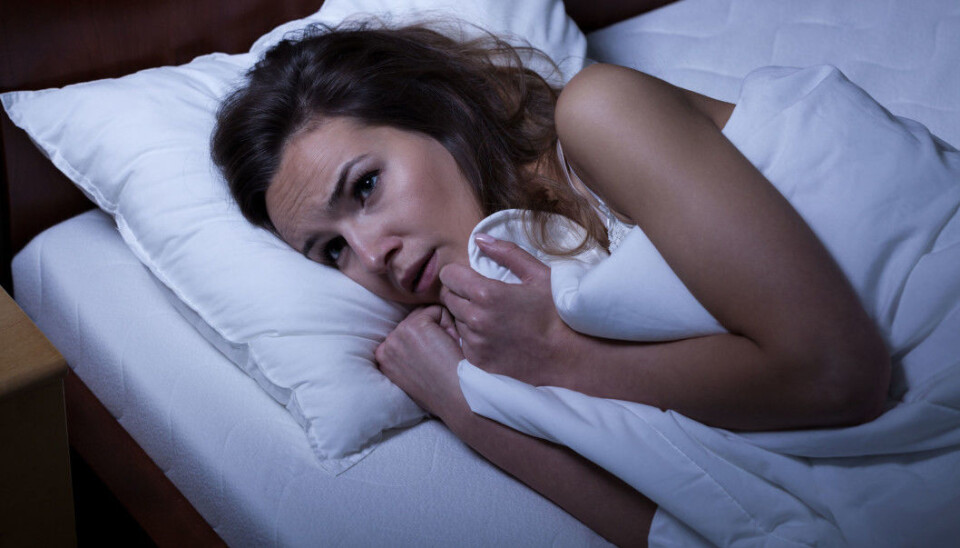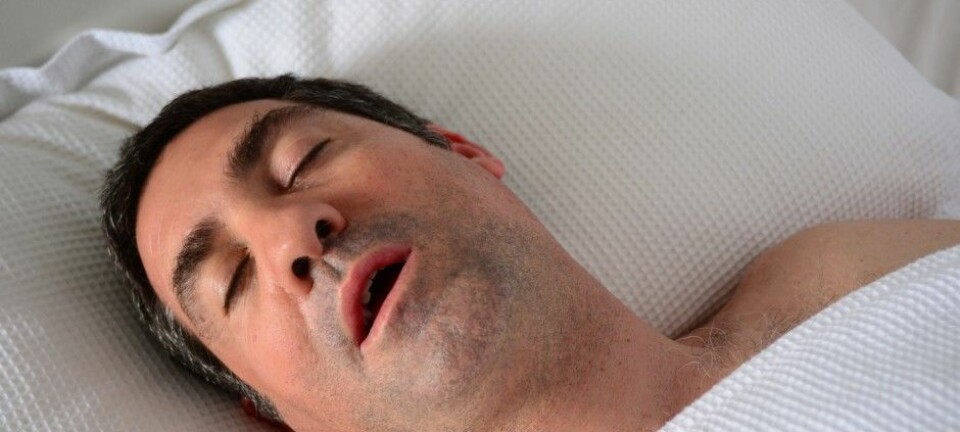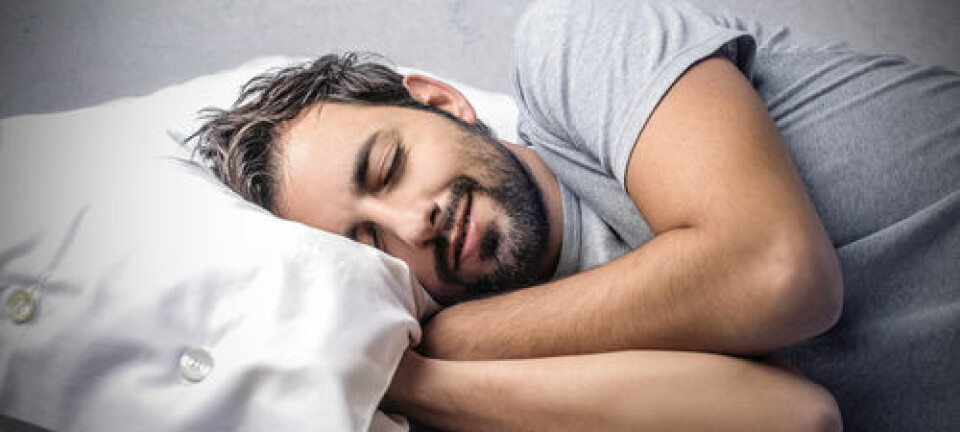
How sleep washes away our worries
New Book: Why you often feel better after a good night's sleep.
Lots of us have experienced the turmoil of worrying thoughts creeping in after we go to bed at night.
What did I actually tell my friend about her husband tonight? Was she a little offended? And was that look from my boss a sign that she was dissatisfied with my presentation today?
But upon waking the next day, we often find that the worries have been washed away during the night. We're able to smile at an something that felt like a big deal the night before.
So what's going on in the brain while we sleep?
Christian Benedict, a sleep scientist at Uppsala University, Sweden, gave an explanation recently when he held a lecture during the "Brain Conference" in Stockholm.
He and science journalist Minna Tunberger recently published a book on the topic: Sömn, sömn, sömn
(Sleep, Sleep, Sleep). Only available in Swedish.
Maintains mental balance
We go through different sleep stages during the night. In the last sleep phase, often called REM sleep or dream sleep, activity increases in the amygdala. This is the brain's emotional centre.
WHile asleep, we process memories that are filled with emotions.
When these memories appear, the drama of what we experienced in an awake state is defused in this sleep phase, Benedict says.
The authors use the analogy of a wise paarent who tells their child, "Don't worry about it. I have it under control."
Benedict believes that the washing away of worries in the brain during the REM sleep phase has an important function in our bodies. Dedramatizing our feelings is the body's ingenious way of handling strong emotions and preventing mental imbalance.
Feelings or reason
The authors describe how researchers using a so-called magnet resonance device have been able to see what is happening in the minds of people who were exposed to unpleasant and scary things.
When the study participants looked at scary images, the researchers observed that the amygdala – the feeling centre of the brain – was activated.
After showing the participants disturbing images, the researchers let half of the trial group sleep and kept the other half of the group awake throughout the night. When they were shown the same pictures the following day, researchers saw big differences in the two groups' brains.
Participants who hadn't slept became even more frightened, while those who had slept all night had less activity in the amygdala. The trial group that slept had more activity in the front part of the cerebral cortex. This is the "reasoning centre" of the brain, where stress and impulse control are managed.
The researchers believe that when you get too little sleep, the amygdala does not 'hear' messages from the brain's reasoning centre. Over a long period of time, you risk becoming emotionally imbalanced.
Lack of sleep affects mental health
Sleep problems are very common in people with various mental disorders, as Håvard Kallestad showed in his doctorate in 2012. He is currently researching sleep treatment at NTNU in Trondheim, Norway.
Kallestad believes that depressed individuals have a different REM sleep than healthy individuals. The researchers also believe that people who are on SSRI antidepressants may have greater difficulty in reaching a dream sleep state.
Researchers have often thought of sleep issues as a symptom of depression.
We might think that sleep problems disappear once patients seek treatment. However, 40 to 70 per cent of the patients still have sleep difficulties after they have overcome the depression.
"Now we're starting to think that sleep problems may contribute to maintaining the depression," says Kallestad.
Cognitive treatment helps sleep difficulties
As to what comes first, the sleep difficulties or the depression, researchers aren't yet sure.
For patients, the two problems are so closely linked they can't say which on.
"Having sleep problems is a risk factor for depression. And being depressed is a risk factor for getting sleep problems. This may go both ways," says Kallestad.
But cognitive treatment for insomnia has shown good results, says Kallestad.
It's all about changing habits.
Therapists consider how you think about sleep. They also talk to patients about what to eat or drink and what to do or not do before going to bed. The goal is for all patients who dread going to bed to be able to look forward to crawling under the covers in the evening, Kallestad says.
Work on sleep all day
Benedict's best sleep advice is to take good care of our natural circadian rhythm.
Benedict encourages people to make sure they create a contrast between what they do during the day and what they do in the evening.
We have to work around the clock to sleep well, he says
This is especially important in a world where we spend so much time in front of a computer screen for a large part of the day.
Get some daylight!
Our bodies have evolved to orient themselves to daylight.
People need to be active during the day. We have lived most of our lives when it's bright outside to gather food and protect ourselves from enemies.
Daylight plays a crucial role in our daily rhythm. But we do not need that much of it. On a sunny day, it's enough to be outside for 30 minutes. On a cloudy day we have to be out for about an hour to get the same amount of light.
If you don't have the opportunity to get outside during the day, Benedict recommends sitting near a window.
Benedict and his colleagues recently published an article in the scientific journal Sleep Medicine, where they show that patients who were closest to the window in the hospital slept an entire hour more per night than patients farther away from the window. These patients also recovered more quickly and had shorter hospital stays.
If we get a decent dose of daylight during the day, our brain is less sensitive to the blue light from technological devices in the evening, Benedict says.
In one of his experiments, patients who used tablets set to full brightness did not have trouble sleeping, provided they had gotten plenty of daylight during the day.
Eat less for dinner
Benedict offered another piece of clear advice on how to eat during the day if we want to sleep well at night.
"Eat like a king in the morning, like a prince for lunch and like a pauper for dinner," he says.
Researchers have found that people who only eat between 07:00 in the morning and until sometime between 17:00 and 19:00 in the evening sleep better than others.
Big, heavy meals late in the evening put your gut to work at night, when the intestines would rather rest up for the next day.
Meat and fatty foods stay in the stomach a long time and keep the body awake longer. Onions or fibre-rich foods produce gases in your gut during the night.
"If you eat a kebab with chips and have a glass of wine just before you go to bed you shouldn't be surprised if you can't get to sleep," says Benedict.
Don't nag about sleep
People who suffer from insomnia have probably heard this more than once:
You need to sleep at least seven hours each night or you'll get sick!
But the more anxious you become because you can't sleep, the more your body produces the stress hormone cortisol. This makes it even more difficult to get into the deepest and most valuable sleep, says Benedict.
"Instead of talking about how important it is to sleep seven to nine hours each night, we should be more concerned with our individual need for sleep," says Benedict.
We have to accept that we sleep poorly in some periods of our lives, like when we have small children or in menopause.
Other reasons may also contribute to poor sleep quality, such as having diabetes or depression.
Variable amounts of sleep
When researchers look at large groups of people and how much they sleep, it seems as if seven to nine hours are optimal for adults to stay healthy.
However, some people probably have a genetic profile that enables them to cope with less sleep, says Benedict.
Some individuals' quality of sleep may be unusually good, so they rarely wake up. They get an extra good and deep sleep and do not have to sleep as many hours. In these cases, the sleep quality is good enough to keep both the brain and the immune system in good shape.
Others are light sleepers and wake up multiple times during the night. These people need more sleep to compensate.
Keep a sleep journal
Benedict has one more piece of advice:
Find out how much sleep you need sometime when you're on vacation and don't have to wake up early.
Do not set the alarm clock, and just sleep until you wake up in the morning. Then you will sleep for as long as your body needs.
"Notice how long you sleep then. It is also a good idea to keep a sleep journal," he says.
----------------
Read the Norwegian version of this article at forskning.no


































